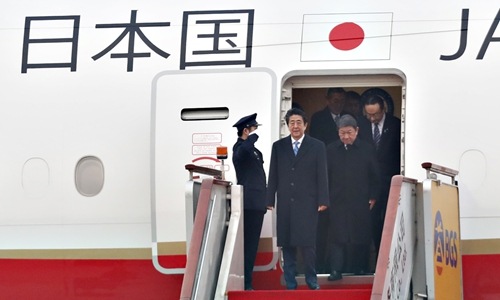HOME >> OPINION
In need of achievements, will Abe gain from the trilateral summit?
By Lian Degui Source:Global Times Published: 2019/12/23 18:31:23

Japanese Prime Minister Shinzo Abe arrives at Beijing on Monday for the China-Japan-South Korea trilateral summit. Photo: China News Service
Due to violent protests in northern India, Japanese Prime Minister Shinzo Abe postponed his visit to the South Asian country, which was scheduled between December 15 and 17. His plan to participate in the China-Japan-South Korea trilateral summit on Tuesday with a Japan-India defense logistics sharing agreement was thus wrecked.Take a look at Abe's diplomatic achievements in 2019. He may have nothing to brag about in terms of Japan's relations with Russia, North Korea, South Korea and even the US. His trip to Chengdu, capital of Southwest China's Sichuan Province, to attend the trilateral summit might be his last chance to score some accomplishments.
Japan's ties with Russia have seen no progress. The Abe government has continued to seek progress in Japan-Russia "joint economic activities" this year, but Moscow has refused to soften its stance. The "joint economic activity" is an idea discussed by the two sides to settle territorial disputes during Russian President Vladimir Putin's visit to Japan in December 2016, which is in essence Japan's plan to make Russia admit that territorial issues do exist between the two countries. Moscow made it clear in August that these activities must be conducted under Russian laws, which was in fact a refusal to Tokyo's proposal. Putin also believes that Japan-Russia relations can hardly go further without improvement in Russia-US ties, as Tokyo seeks nothing more than a solution to territorial issues.
A breakthrough in Japan-North Korea relations is unpromising. Japan has followed the US for years in claiming sanctions against North Korea. But the US-North Korea summits have been a smack in Japan's face. With the fear that Washington and Pyongyang might reach a deal without Tokyo, Japan has continued demanding pressure on North Korea to force it to dismantle nuclear weapons and return kidnapped persons.
But Pyongyang will not discuss the nuclear issue with Tokyo and it believes that the abduction issue has already been resolved.
Japan is also worried about being isolated by the international community on the North Korea issue, so it proposed in May to hold an unconditional dialogue with North Korea. Pyongyang has noticed this proposal but took no further steps. Pyongyang insists that the abduction issue has already been settled, but Tokyo holds that no solution to the abduction dispute means no lifting of sanctions. Even if an unconditional dialogue can be realized, it would be tough for the two sides to make a significant breakthrough.
Japan-South Korea ties are also in an impasse. After South Korean top court's ruling in 2018 that ordered Japan companies to compensate South Korean wartime forced labor, Tokyo tightened export of semiconductor materials to South Korea, which were in essence sanctions on the country's high-tech and economic industry. The two sides' historical disputes have turned into trade frictions.
In retaliation, Seoul once considered abrogating the General Security of Military Information Agreement between the two countries. Although under US pressure, the Blue House later announced that the intelligence pact would be kept in place with conditions, the Seoul-Tokyo tension is still hard to be alleviated.
Japan-US relations are on a rocky road. Although the two are allies, US protectionism has harmed Japan's interests. As the year drew to a close, Japan's upper house approved the US-Japan trade deal. But the opening of Japanese rice market, an issue that the US is most concerned about, has not been settled yet. In addition, the US asked Japan to hike payment for US troops, which has puzzled Japan.
Abe's trip to China might be a highlight. To expand its diplomatic space, Japan has on one hand maintained its alliance with the US, and on the other stepped up drawing India over to its side. Abe planned to sign agreements and discuss third-party cooperation with India, and meanwhile to convince New Delhi to join the Regional Comprehensive Economic Partnership before visiting China.
But it appears that the trip to China will be his last chance to achieve something in 2019. The trilateral summit will serve as a platform for the three leaders to coordinate on the Korean Peninsula issue, FTA and other regional issues.
Abe has already begun to attach importance to improving relations with neighboring countries and seeking a breakthrough for Japan's diplomatic independence. But perhaps due to these countries' piled-up grievances or Abe's lack of sincerity, he has so far reaped nothing in neighborhood diplomacy.
The trilateral summit might be one of the few bright spots of Abe's diplomacy this year.
The author is director and professor at the Japanese Studies Center, Shanghai International Studies University. opinion@globaltimes.com.cn
Posted in: ASIAN REVIEW